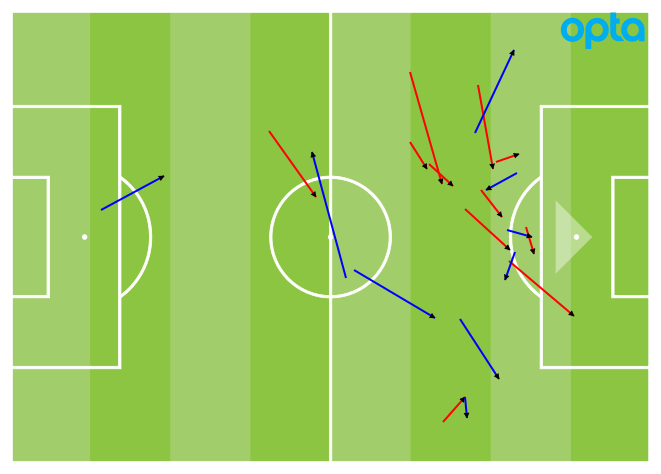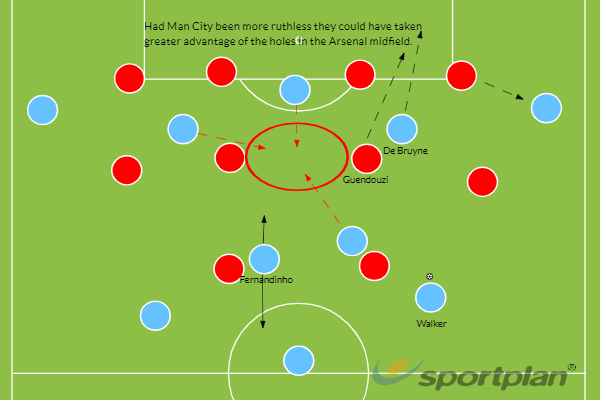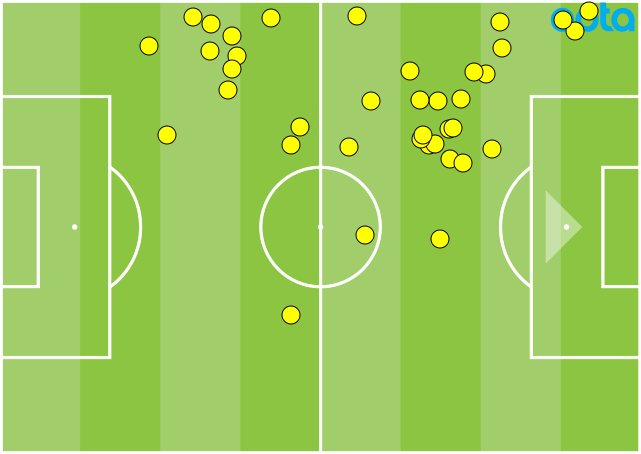But, looking past the scorelines, what were the main tactical lessons to be taken from the latest round of fixtures? Goal takes a look at the biggest talking points...
Higuain offers Chelsea hope with Hazard link-ups
Looking beyond the highlights reel of Gonzalo Higuain's performance against Huddersfield, there were encouraging signs in his early relationship with Eden Hazard, as well as some sloppy touches that suggest it may take the
Argentinainternational a while to get up to the speed of Premier League football.
Higuain frequently held up the ball (or, without touching it, held off a defender to free up space for a team-mate) much like the man he replaced, Olivier Giroud, but unlike the Frenchman, Higuain showed a superb ability to dart into space out of nowhere.
That sharp turn - most notably seen for his first goal, in which two centre-backs were taken out of the game in the blink of an eye - is what makes Higuain a top striker. It is also what makes him perfect for the sudden vertical one-two passing that is essential to Sarriball.
The new Chelsea striker’s link-up with Hazard was also Giroud-esque.
Throughout the opening 45 minutes, Hazard turned the ball round the corner with his first touch, instinctively finding his team-mate and moving to receive the lay-off.
However, too often, Higuain’s final pass was wayward (13 in total), and twice from promising two-on-two situations he made the wrong run. It may take some time before Higuain shows the fitness, consistency, and teamwork that made him so ruthless at
Napoli.
PIC: Passes between Higuain & Hazard vs Huddersfield
Llorente the key as Spurs leave it late again
For the opening 60 minutes at Wembley, Spurs laboured badly, with Lucas Moura failing to make an impact as a false nine while Son Heung-min toiled down the left, partly because Jan Vertonghen lacks the technical ability to combine with him on Spurs’ favoured flank.
In short, their 4-2-3-1 was too disconnected to trouble such a well-drilled Newcastle 5-4-1.
But the game changed when Mauricio Pochettino brought Fernando Llorente on for Lucas and instructed Son and Erik Lamela to move infield to support the Spaniard.
Llorente was typically inconsistent, and yet his mere presence meant the Magpies' centre-backs could not come out and meet the Spurs attackers as they darted around the edge of the D.
Son and Lamela combined superbly to create a good opportunity within 10 minutes of Llorente’s arrival, finally taking advantage of Newcastle’s under-staffed central midfield after previously looking to attack predominantly down the wings.
Eventually, the goal came thanks to a Llorente knock-down and a Son strike from the edge of the area - a simple move that epitomised Spurs’ change of tack.
It was a minor tweak, and a fortunate goal, but nevertheless here was an example of Pochettino’s tactical flexibility and willingness to give detailed attacking instructions from the touchline.
Guardiola goes full Cruyff to get City back on track
Pep Guardiola unveiled a new hybrid 4-3-3/3-2-2-2-1 for the game against Arsenal on Sunday, taking everybody by surprise with a system that asked Fernandinho to replicate the Johan Cruyff teams of old by alternating between centre-back without the ball and central midfield with the ball.
When City were in possession, Aymeric Laporte and Kyle Walker tucked in to make a flat back three, Fernandinho moved up alongside Ilkay Gundogan, David Silva and Kevin de Bruyne ran the half-spaces, and Raheem Sterling and Bernardo Silva hugged the touchline, as detailed in the image below.
This created a spread formation that allowed City to hog the ball in that 3-2 base, widen the Arsenal formation with touchline-hugging wingers, and then use De Bruyne and Silva to capitalise on the gaps created between the stretched Arsenal lines.
The original intention behind Guardiola’s unusual tactics may have been to counteract Unai Emery’s diamond 4-4-2 (Fernandinho’s flitting role could have suffocated Aaron Ramsey while leaving three defenders free to track Arsenal’s two strikers), but in the end the Gunners were predictably unpredictable in their own approach.
The hosts won fairly comfortably regardless, and Laporte deserves particular praise for his positional play in a complex left-back/centre-back role; it was his cross that handed City a 50-second lead.
Bizarre Emery tweaks holding Arsenal back
For 25 minutes or so in the first half at the Etihad Stadium, Arsenal were competitive, with a superb Matteo Guendouzi out-battling the City midfield in an organised, ultra-deep 4-4-2. Alexandre Lacazette and Pierre-Emerick Aubameyang sat on top of the City midfielders and troubled the hosts.
But when analysing the 90 minutes as a whole, Arsenal were roundly beaten: knackered in the second 45 largely because the gaping holes in their 4-4-2 had required endless running in the first half just to keep up.
Fielding only two central midfielders against Man City is bold, to put it kindly. A sharper, slicker City performance would have brought plenty more goals on Sunday, as De Bruyne and Silva frequently made simple runs off the back of the Arsenal midfield into acres of room in the half-spaces.
Emery has made a habit of wild, unexpected tactical decisions during his debut season in English football – and it is starting to hold Arsenal back.
The diamond 4-4-2 deployed against Chelsea in January could have worked well on Sunday, but instead he chose a brand new system for arguably the most challenging fixture of the campaign. Very bizarre.
Sanchez sluggishness stalls Solskjaer revolution
Following Tuesday’s ambling 2-2 draw against
Burnley, Ole Gunnar Solskjaer needed a vibrant, fluent performance from Manchester United against
Leicester City.
Instead, he got another worryingly low-tempo display that was not dissimilar from the Jose Mourinho era, and the interim manager must find a way to re-energise his players or risk falling back down the shortlist.
In the opening stages, United’s forwards were frequently swapping positions as the team looked to play quick one-touch forward passes, Jesse Lingard and Paul Pogba pressing high and weaving through a Leicester City midfield that – with Nampylis Mendy in it – was always there for the taking.
But things quickly went stale. In the first 12 minutes, United had four shots, played three key passes, and attempted two crosses. In the final 85 (including injury time) they had just six shots, played six key passes, and attempted six crosses.
The answer may be to remove Alexis Sanchez from the starting XI as the
Chileinternational cannot offer the same piercing turn of pace as Anthony Martial.
However, Solskjaer must also find a way to get more out of his full-backs, both of whom were stunted by Leicester. Diogo Dalot deserves another shot at right-back, for example.
PIC: Sanchez touches vs Leicester City











0 Comments